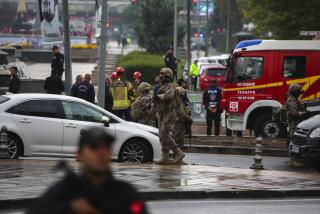Blast targets a top Iraqi official
- Share via
BAGHDAD — In an assassination attempt apparently plotted from inside the government, a bomber tried to kill one of the nation’s vice presidents as he made an official appearance Monday at an Iraqi ministry. Five people died and dozens were injured, prompting questions about Iraq’s ability to ensure its own security.
The bombing targeted Adel Abdul Mehdi, one of two Iraqi vice presidents and a top leader in the largest Shiite Muslim voting bloc in parliament. He was not seriously injured. The blast was detonated as Abdul Mehdi attended a morning ceremony honoring employees of the Ministry of Municipalities and Public Works.
Khasim Mosawi, a spokesman for the Iraqi military enforcing the new security plan in Baghdad, acknowledged that the attack had been planned and carried out from within the government, but he defended the security precautions taken in advance of Abdul Mehdi’s visit. “There are violations from inside” the ministry, he said. “We admit that.
“We are not expecting terrorists to stand by and watch the plan succeed,” he said. “We are expecting them to increase their violence, but with time we are going to eliminate such terrorist acts for good.”
The ministry bombing provided further evidence that the U.S.-led military mission and the fledgling Iraqi government face determined enemies who continue to adapt their tactics to the security crackdown, now in its third week, that is intended to halt sectarian violence.
It served as a reminder of how far U.S. and Iraqi officials have to go to establish security in the capital, in the halls of government and on the lawless streets.
“This situation proves there is a deep and profound break in the security system,” said Wamid Nadhmi, a political science professor at Baghdad University. Combined with other violent incidents in recent days, he said, “it gives the impression that American and local forces are going nowhere.”
The bomb exploded inside the hall where the ceremony was taking place, in an affluent area of west Baghdad dominated by Sunni Arab Muslims, just as Public Works Minister Riyadh Gharib had completed a speech and returned to his seat next to Abdul Mehdi on the stage.
Witnesses said the bomb appeared to have been planted two to three yards from the stage and was packed with ball bearings. Thick, dark smoke filled the room, and the ceiling caved in.
Though Abdul Mehdi, a popular leader who plays a largely ceremonial role in the government, escaped serious harm, two ministry department heads were among those killed.
Abdul Mehdi and Gharib were taken to the Ibn Sina Hospital in the heavily fortified Green Zone, which is staffed with American military medical personnel. Abdul Mehdi was released.
The incident was the most high-profile on a day when insurgents appeared to have focused their strikes on government and police targets rather than civilian sites such as marketplaces, universities and mosques.
A suicide car bomber killed 13 people and wounded 10 at a police checkpoint in Ramadi, a hotbed of the Sunni-led insurgency west of Baghdad. A roadside bomb killed three Iraqi police officers and injured four as their convoy passed through east Baghdad, and gunmen attacked a fire-and-rescue station on the west side of the capital, killing three police officers.
A suicide bomber detonated a car bomb at a military checkpoint near the northern city of Kirkuk, killing a civilian. In the south, British forces said 15 gunmen attacked a military patrol in Basra on Sunday night. Three attackers were wounded in the battle, but Britain did not say if any of its soldiers were harmed.
In the weeks since the security plan was announced, the daily number of bodies recovered by police, often victims of Shiite death squads, has decreased. Muqtada Sadr, a radical Shiite cleric who leads the largest Shiite militia, the Al Mahdi, had initially endorsed the security plan.
But mass attacks on Shiite citizens and authorities, attributed to Sunnis and other insurgents, have continued, raising questions about how long Shiites’ patience will last before they take up arms again. Sadr issued a statement Sunday saying the plan appeared to be futile and calling for the U.S. to leave Iraq.
*
christian.berthelsen@latimes.com
Times staff writers Said Rifai, Zeena Kareem and Saif Rasheed and special correspondents in Baghdad, Kirkuk and Basra contributed to this report.
More to Read
Sign up for Essential California
The most important California stories and recommendations in your inbox every morning.
You may occasionally receive promotional content from the Los Angeles Times.












